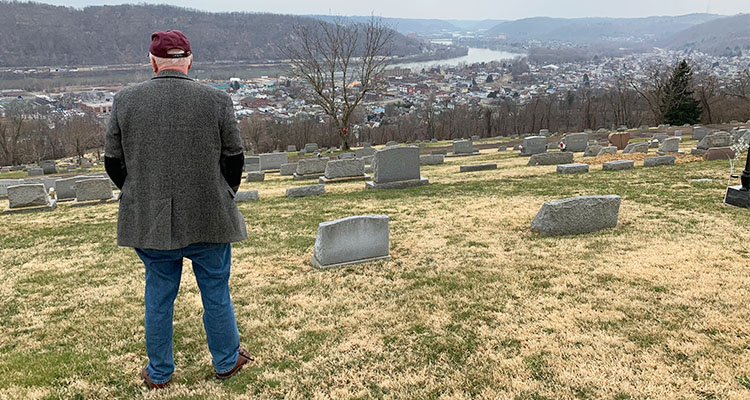Driving through a bottomless pothole (it wasn’t), inching to the left of a crag in the road that no four-wheeler in its right mind would attempt, negotiating railroad ties not in synch with any human’s gait and scrambling up embankments in search of the last remains of the Terminal Bridge …
Exploring James Wright’s Martins Ferry with West Virginia poet laureate Marc Harshman certainly turned out to be quite the adventure.
But pothole-as-deep-and-wide-as-the-Ohio River aside, we made our way to landmarks in Wright’s birth city and to lines in his poems.
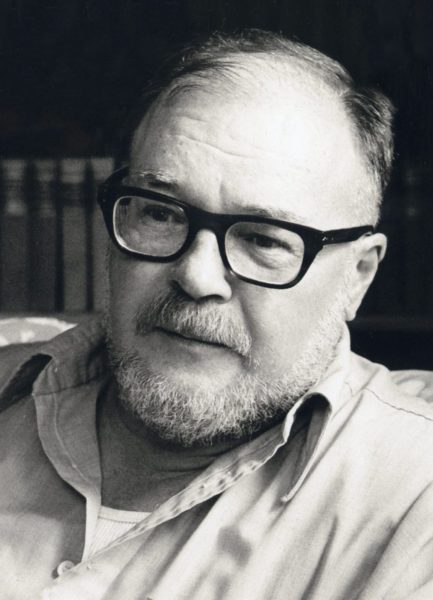
Wright, a respected poet and Pulitzer Prize-winner, called Martins Ferry home in the 1920s and ’30s. He also called it the “unspeakable rat-hole where I grew up.” (Those words were sent in a letter to fellow poet Robert Bly, according to “James Wright: A Life in Poetry” by biographer Jonathan Blunk.)
I brought with us on our expedition a map of James Wright’s Martins Ferry compiled by John Storck, former director of the Martins Ferry Public Library and member of the James Wright Poetry Festival committee for many years.
The impetus for the tour, was this, explained Harshman: “The next poet in the Wheeling Poetry Series, John Hodgen, who’s speaking in just a couple weeks [April 23] at the Ohio County Public Library, said he would see it as a special, particular favor if I was able to show him even a couple of the Wright sites.
“At the same time, it hit me that all those years of attending the [James Wright] festival I never really availed myself of the tours that were sometimes offered, and if I did, I’ve clearly forgotten whatever I’ve seen and wanted to be re-reminded.”
It was an afternoon of being re-reminded.
We visited 613 Union St., the site where Wright was born, now an empty lot, and the site of Shreve High School, also an empty lot. We drove down Pearl Street, where the Wright family occupied a couple of homes in the 700 block.
Old Bud Romick has fallen asleep as the twilight comes down Pearl Street in Martins Ferry, Ohio. — “Old Bud”
And we checked out the old WPA swimming pool.
… my father/And my uncles dug a hole in the ground/No grave for once. — “The Old WPA Swimming Pool in Martins Ferry, Ohio”
We found where 1016 Broadway would’ve been, where Wright lived from the age of 10 to 17. Now the address appears to be part of United Dairy. That house was the first home his family ever owned.
“More than any other place, 1016 Broadway formed his idea of home,” wrote Blunk in Wright’s biography.
We tried to find the Bluthardt Orchard (“An Offering for Mr. Bluhard” [sic]) but the roads just kept ending — or looking like they may be impassable, and we weren’t sure we wanted to do that again.
Driving along the river and the railroad tracks, we came upon a view of Wheeling Island.
“Right there’s the tip of the island,” Marc said. That was Bareass Beach. “That’s a good landmark!” Marc exclaimed. “Let’s get out and look, we might be able to find something!”
Oh, my secret and lovely place, upshore from the railroad! My bareass beach! — “Many of Our Waters”
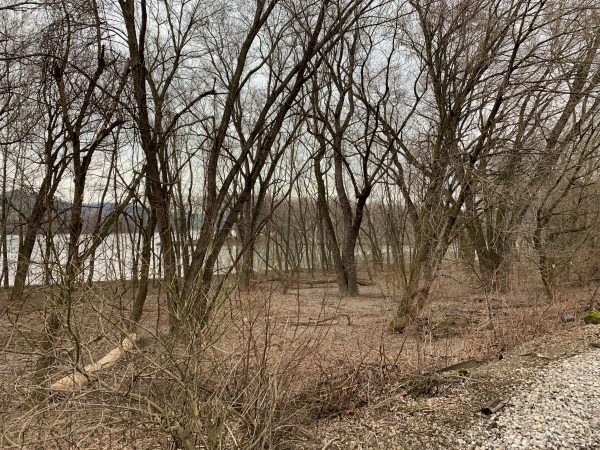
We think we found the now stopped-up sewer main. …
I had found a way/To sit on a railroad tie/Above the sewer main./It spilled a shining waterfall out of a pipe/Somebody had gouged through the slanted earth. — “Beautiful Ohio”
… And where the Terminal Bridge once spanned the river from Madison Street in Ohio to First Street in North Wheeling. Both are near where Hobo Jungle would’ve been. All are mentioned in Wright’s poems.
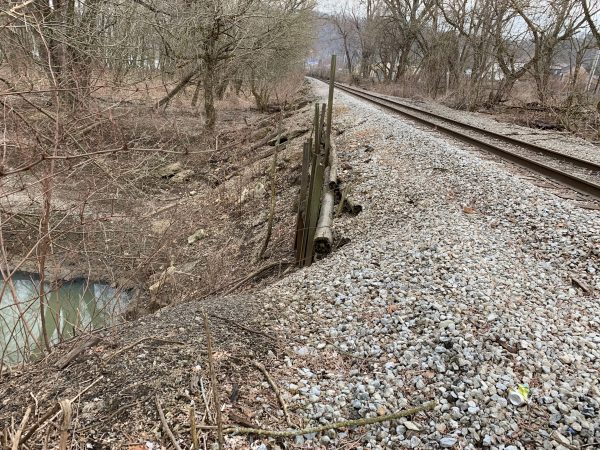
And we caught a glimpse of the Shreve High Stadium (now Martins Ferry High School Stadium) from the Riverview Cemetery.
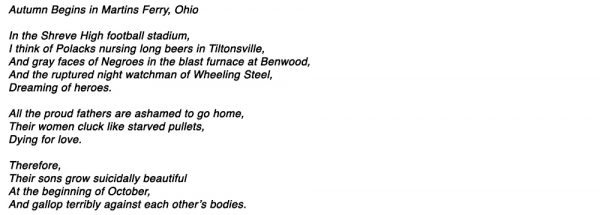
Riverview Cemetery is where Marc and I started the day’s adventure.
He climbed to the graveyard summit again on Christmas Eve, 1951, a month before he graduated from Kenyon College. Liberty Kardules, a nursing student and high school classmate, stood beside him. [Wright’s future wife.] They could see the Blaw-Knox and Laughlin steel mills dominating the northern edge of the flats beside the river and, among the factories, the green rectangle of the high school football field. They saw the train and streetcar lines, and the Terminal Bridge crossing at the tip of Wheeling Island. … Wright gestured to the town below them and cursed the place. “‘Give up hope, all ye who enter here.’ It’s pure hell down there. Just pure hell.” — James Wright: A Life in Poetry
“I loved being on top of the cemetery and really seeing that vista, seeing it as Wright would’ve seen it,” Marc said. “Some of the landmarks are not as easily recognizable to you and I, and may even be gone, but nonetheless we were seeing the same vista. There’s no change in the hills, the shape of the river … it’s all the way Wright would’ve seen it, with Liberty, no less. It’s fun to think she was there with him.”
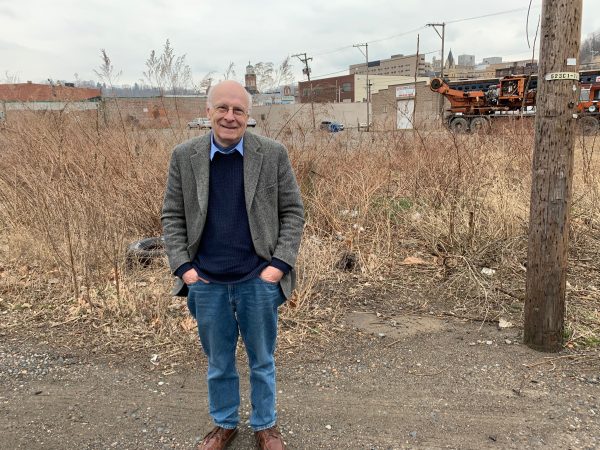
We ended our day’s tour at 23rd and Water streets in South Wheeling to revisit Wright’s poem, “In response to the Rumor That the Oldest Whorehouse in Wheeling, West Virginia, Has Been Condemned”:
I will grieve alone,
As I strolled alone, years ago, down along
The Ohio shore.
I hid in the hobo jungle weeds
Upstream from the sewer main,
Pondering, gazing.
I saw, down river,
At Twenty-third and Water Streets
By the vinegar works,
The doors open in early evening.
Swinging their purses, the women
Poured down the long street to the river
And into the river.
I do not know how it was
They could drown every evening.
What time near dawn did they climb up the other shore,
Drying their wings?
For the river at Wheeling, West Virginia,
Has only two shores:
The one in hell, the other
In Bridgeport, Ohio.
And nobody would commit suicide, only
To find beyond death
Bridgeport, Ohio.
“Retracing the landmarks of Wright’s life,” Marc said, “I’m struck more powerfully about how he says in many places how much he hated this place, and it haunted him. And yet, it’s all through his poems. He kept returning to them again and again and again.”
Just as we did on this drizzly March day, the first day of spring.
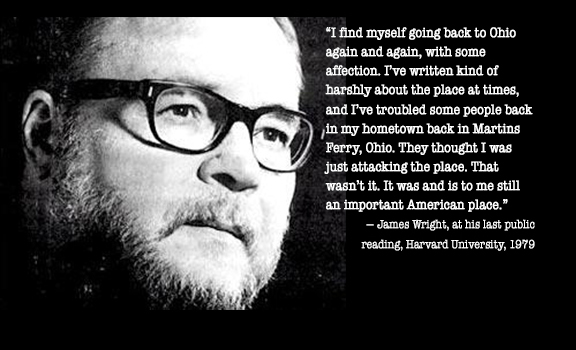 LUNCH WITH POETRY
LUNCH WITH POETRY

West Virginia poet laureate Marc Harshman will host the Wheeling Poetry Series featuring John Hodgen, writer-in-residence at Assumption College in Worcester, Massachusetts, at noon, Tuesday, April 23, at the Ohio County Public Library. Hodgen won the AWP Donald Hall Prize in Poetry for Grace (University of Pittsburgh Press, 2005), and a recent poem was selected for Scribner’s Best American Poetry 2017. Hodgen’s next book, The Lord of Everywhere, is due out next month. For information, call 304-232-0244, or visit www.ohiocountylibrary.org.
• After nearly 38 years as reporter, bureau chief, lifestyles editor and managing editor at The Times Leader, and design editor at The Intelligencer and Wheeling News-Register, Phyllis Sigal has joined Weelunk as managing editor. She lives in Wheeling with her husband Bruce Wheeler. Along with their two children, son-in-law and two grandchildren, food, wine, travel, theater and music are close to their hearts.


